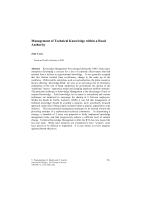Bridges

- Publication no: ABC-IAR011-11
- Published: 31 October 2011
- PDF (free) Download
Knowledge Management first emerged during the 1980’s from major enterprises developing a concern for a loss of corporate effectiveness that had resulted from a decline in organisational knowledge. It was generally accepted that this decline resulted from evolutionary change in the make up of the workforce. Within public enterprises such as road authorities, the prime causative factors affecting ‘knowledge-bleed’ are seen as an increasing rate of retirement, redefinition of the role of Road Authorities by government, the demise of the ‘traditional’ master – apprentice model and changing employee mobility attitudes. The particular challenge in Knowledge Management is the interchange of tacit or acquired knowledge. Such knowledge, by its nature is internalised and various techniques are employed to encourage the sharing of it between employees. Within the Roads & Traffic Authority (NSW) it was felt that management of technical knowledge should be awarded a separate, more specifically focussed approach, rather than it being simply included within a general, organisation-wide initiative. This has permitted management techniques to be tailored towards the prevailing attitudes of a sophisticated technical community. In determining a strategy, a timetable of 5 years was proposed to firstly implement knowledge management tools, and then progressively achieve a sufficient level of cultural change. Technical Knowledge Management within the RTA has now passed the two-year mark. While most initiatives are considered to have ‘worked’, some have proven to be difficult to implement. It is now timely to review progress against planned objectives.
